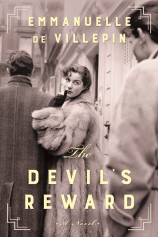The Devil's Reward
Review
The Devil's Reward
Towards the end of Emmanuelle de Villepin’s latest novel, THE DEVIL’S REWARD, 86-year-old Christiane describes a charming and elegant gentleman, the kind to be found in certain books “filled with strong-willed characters and heroes who don’t age.” De Villepin could be describing the men and women of her own story. In it, Christiane, prompted by her granddaughter Luna’s research on Rudolf Steiner, begins to reminisce about her parents, aunts and uncles as they explore questions about love and spirituality during the war years in France and across Europe.
Christiane’s daughter, Catherine, frustrates her, to say the least. The feisty Christiane wishes that Catherine was bolder, more adventurous, and more willing to question and contradict. The steady Catherine is too much like Christiane’s rigid and religious mother Marguerite, a woman of whom Christiane has few positive memories. When Catherine’s husband, a dashing Italian named Lorenzo, cheats on her once again, she and Luna come to stay with Christiane in Paris. Christiane, encouraged by Luna’s curiosity as well as the grief she has lived with since the death of her husband, starts sharing with the two women she loves the most stories about her beloved father and the passions and ideas that drove him.
"An exploration of secrets and the bonds of family and love, THE DEVIL’S REWARD is a contemplative, thoughtful and honest look at essential relationships."
Christiane and her older brother, Gabriel, called their father Papyrus. He was a daring veteran of both WWI and WWII who married the young woman whose faithful gift he believed saved his life in battle. But the love of his life may have been his sister-in-law, Bette, a free-thinking and compelling woman. It is Bette who creates all the bridges in the story: sister-in-law first to Christiane’s mother and then to her father, she introduces Papyrus and his friends and relations to the trendy metaphysical practices of anthroposophy. Bette, more so perhaps than Marguerite, is the other defining figure in Christiane’s youth; she balanced out the increasingly unhealthy and distant Papyrus as he struggled with injuries and the traumatic after-effects of the war. And when Christiane’s future is at stake, it is Aunt Bette who steps in to save her.
Christiane is a conversational narrator, almost casual. But de Villepin’s style (and C. Jon Delogu’s translation) is elegant and formal. Not much happens, plot-wise, in THE DEVIL’S REWARD, but there is plenty of introspection and emotional work happening. Christiane thinks back to the adults who shaped her and the relationship with the adult who she, in turn, shaped. The story of Papyrus and the women who loved him, including Christiane herself, mirrors that of Catherine and Lorenzo in some ways, and it seems that sharing the truths of her parents’ marriage frees Christiane to see how Catherine is importantly different from Marguerite.
De Villepin sets her novel not only in the difficult war and interwar years in France, but introduces the ideas of Steiner, giving her characters a set of interesting beliefs to respond and react to. Luna, in the present time, is fascinated by those ideas as well, though they seem to her far less relevant than they did to Bette. This is yet another subtle contrast de Villepin achieves.
An exploration of secrets and the bonds of family and love, THE DEVIL’S REWARD is a contemplative, thoughtful and honest look at essential relationships.
Reviewed by Sarah Rachel Egelman on May 4, 2018
The Devil's Reward
- Publication Date: May 1, 2018
- Genres: Fiction, Women's Fiction
- Paperback: 256 pages
- Publisher: Other Press
- ISBN-10: 1590518683
- ISBN-13: 9781590518687




